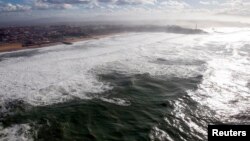We are dependent on the world’s ocean for the very air we breathe. The ocean produces 50 to 70 percent of our oxygen. It regulates our climate, absorbs carbon dioxide, and supports the greatest abundance of life on our planet. Nonetheless, our ocean is under attack from human activities. For that reason, the United States is committed to improving the health of our ocean.
In June, the United States hosted the Our Ocean conference aimed at finding ways to protect the ocean from the effects of climate change, overfishing, and pollution. In late September on the margins of the United Nations General Assembly, Secretary of State John Kerry convened government ministers, civil society leaders, and philanthropic representatives to discuss implementing the action plan from the June conference. “Our mission here is clear,” said Secretary of State Kerry:
“We need to put an end to overfishing by ensuring that every fish that makes it to market is caught legally in a way that’s reported and traceable. And we need to do a better job of protecting our ocean’s fish stocks, which play a critical role in economic security for millions of families and in food security for millions more.”
The U.S. Government is working to protect our oceans, including through the three following initiatives.
The UN Food and Agriculture Organization’s Port State Measures Agreement will prevent illegal, unreported and unregulated fish from being landed in ports. “The countries which sign on as parties to this treaty will commit to taking basic but effective steps to ensure that illegally caught fish cannot make it up the market chain through their ports,” said Secretary Kerry. The United States is moving toward joining the Port State Measures Agreement, and encouraging other countries to join as well.
On September 25th, President Barack Obama took action to protect one of the United States’ most pristine ocean areas by approving the expansion of the Pacific Remote Islands Marine National Monument, making it the world’s largest marine protected area where commercial fishing and other extractive activities are completely banned.
In June, President Obama created the U.S. Presidential Task Force on Combating Illegal, Unreported, and Unregulated Fishing and Seafood Fraud. In December, this interagency task force will present recommendations on steps the U.S. can take to ensure that seafood sold in the United States is legally and sustainably caught.
“This really is a matter of stewardship. It’s also a matter of generational responsibility,” said Secretary Kerry.






